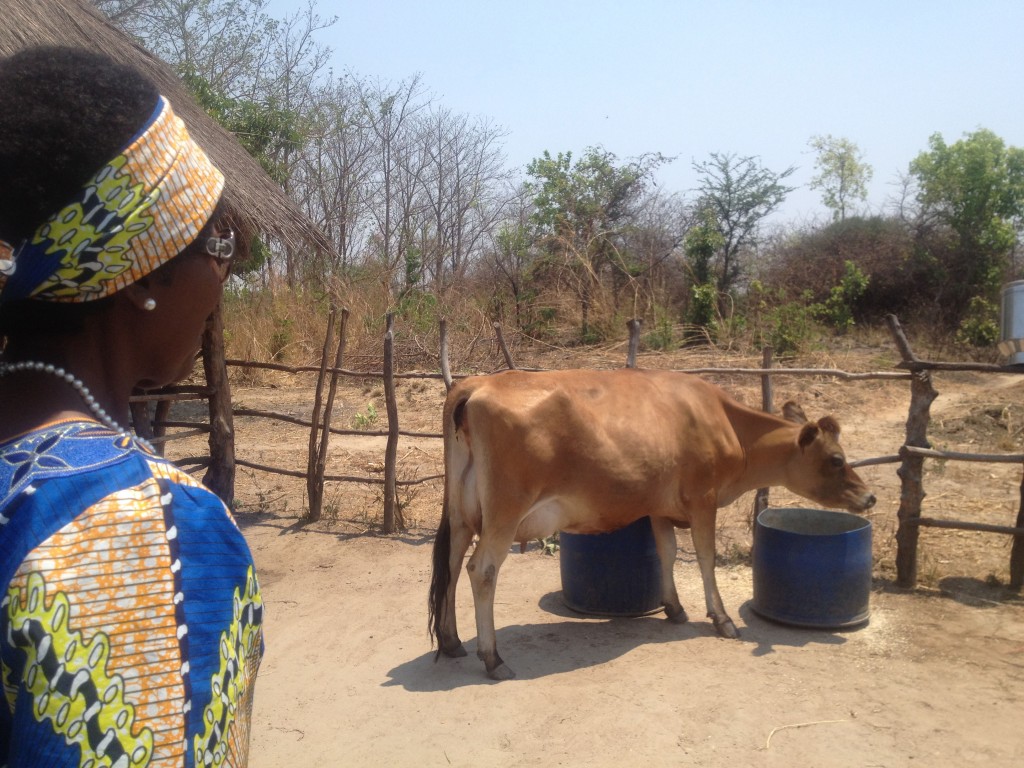Heifer Zambia participant Mrs. Elizabeth Lungu lives in a tiny brick hut in a small, remote village in the community of Baraka in Mpima District, Zambia. She shares her home with her husband and their small children. On the hot, dry day that we visited her, there was not a cloud in the bright blue sky. There was a lot of commotion when our car pulled up at her home. Women in colorful Kitenge, or sarongs, gathered curiously around the yard. Children fled to cling to their mothers’ skirts, away from the visitors. Babies on their mothers' backs looked on skeptically.
We were accompanied on this visit by the Zambian minister of Gender and Children, Mrs. Inonge Wina, a slight but passionate woman who carries a strong vision for the future of rural women in her country. We were also accompanied by Mr. Zulu, the government extension agent responsible for providing veterinary support to to thousands of families living in this area. He knows the Lungu family well, as he knows many of the livestock-owning families in the area. He is the person they call for advice with their animals or when the animals need veterinary care.

Mr. Zulu approached the cow standing in the shed nearby the family compound with great familiarity. The Jersey dairy cow, imported from South Africa, was provided to the Lungu family by Heifer International through a Heifer Zambia project in December 2011. Within the project, 90 percent of families are headed by women, so the Minister of Gender was very interested in seeing what kind of difference the livestock can make in their lives. She probed for answers: How do they afford to feed and care for the animal? What return do they get? What is the impact on their livelihoods?
Mr. Lungu pulled out the ledger attached to the cow shed door and referred to his records. The animal costs $120 to feed every month. But in return, they earn $340 a month from the sale of milk alone. For them, the economics add up to significant income, far more in a month than they both made before receiving the gift from Heifer.
For Elizabeth Lungu, the value of the animal extends far beyond its economic benefits. It has given her a tremendous sense of dignity to own something so valuable and to have been able to Pass on the Gift of its offspring to another family in the community as Heifer's model requires. She has also seen her children become healthier as their milk consumption increased.
The Minister explained that in Zambia, property ownership laws have only recently been changed to allow women the right to own property. For example, the law requires that 30 percent of all land should be owned by women. But this is only the statutory law. Customary law – that which is administered by chiefs and other traditional leaders – has not followed suit. "It is the chiefs who are the custodians of culture, and they are not changing as quickly with the times," Minister Wina added.
Within this Heifer Zambia project, the livestock is given to the woman and is legally in her name. This way, in the event of her husband's death or divorce, she will not lose her entitlement or right to the animal. Although she rightfully owns the animal, the entire family receives Heifer training and shares equally the responsibilities and benefits of the livestock.
On the day we visited, a ceremony was being held in the village's common space to celebrate the Passing on the Gift of 44 animals to new Heifer Zambia participant farmers, who also hoped to see their lives improved like the Lungus have experienced.
The Minister nodded in understanding and amazement over Heifer's model. "This is truly how you make a difference in the lives of people."